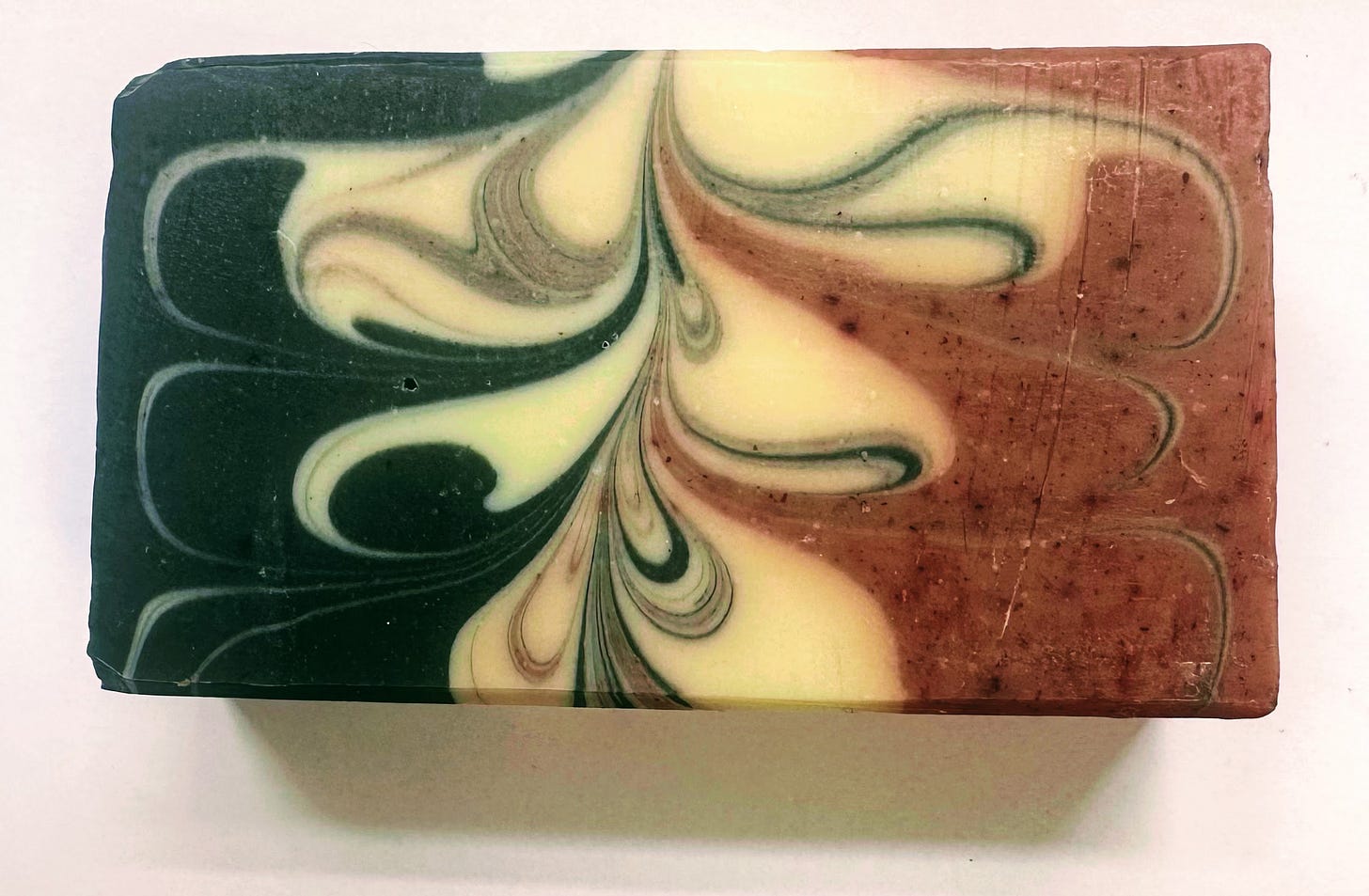A local treasure for everyday enjoyment
The story of Merri Creek Soaps that artfully combine art, smell and touch in a gift of place.
Do you remember Pears soap? It had a unique combination of elements, including rosemary fragrance, concave oval shape, translucent amber colour and gentle glycerine texture. It was a classic among soaps. (And if you’re interested, it was invented by a Cornish barber in 1789, making it the oldest continuing brand in the world today.)
Despite their intense sensory presence in our lives, soaps rarely appear in a list of cultural treasures. In the West, we only value objects that last long enough to find a museum shelf.
Other cultures have different attitudes. I discovered this while working on the Encyclopedia of Crafts in the Asia Pacific region. It surprised me how some countries nominated soap as one of their craft treasures. Palestine celebrated their olive oil soap from Nablus. And there is a similar heritage soap in Tripoli, Lebanon.
So I was intrigued one day while at a local organics shop when I saw a shelf of beautiful soaps produced in my own neighbourhood. Could a modern industrialised suburb like Brunswick have its own local soap?
Merri Creek Soaps are like works of art in themselves. They are layered in soft colours with intricately shaped tops. But more than pleasant to look at, they have redolent fragrances like eucalyptus that conjures up the land.
This makes them the perfect travel gift. Handing over the soap has an immediate effect. Your recipient is instantly enveloped in aromas from far away. And being soap, it has immediate usefulness (though many say they treasure it too much to use).
These soaps are all made by one woman, Sophie Treloar. Her background is an alchemic mix of science and craft.
Sophie's father was a scientist at Melbourne University, specialising in polymer chemistry. When they lived in Sweden, her mother took up weaving to deal with the long dark winters. Soon everyone in the family had a loom.
Her first occupation was as an English language teacher, which she practised for two years in Turkey. But even in language teaching, there are intimations of soap. She was fascinated by the "agglutinative" nature of Turkish grammar: "It sounded like running water."
Then one day a friend brought her some soap from his favourite shop in New York. She was hooked. "All I wanted to do was make soap, because it was so exciting."
She was captivated by the "exothermic chemical reaction." "It's this thing that you can add together oils, and this alkaline substance, caustic soda, and you're making something completely new out of it."
And she could use what was at hand. "You can get what you want from the kitchen—cocoa powder and turmeric. And you can grind up parsley to make it green."
Over the years, she’s learnt how to improve the ethical value of her soaps. At first, she used palm oil which made a beautiful soap, but she soon became aware of the ethical issues. She now buys other oils like coconut from collectives, "In collectives, the women have more bargaining power."
She has also gradually replaced fragrance oils with the more expensive essential oils which have less chemical load. Essential oils are extracted by steam distillation from leafy substances like lemon myrtle.
Some of the brighter colours often come from mica, which is ground into a powder. The white comes from titanium dioxide, commonly found in toothpaste. She is very pleased to have found a biodegradable form of glitter.
Sophie uses silicone moulds to shape her soap. She treasures the rosettes she sourced from South Korea.

But it’s the aesthetic dimension that really attracts Sophie to soap-making. One of her favourite techniques is the "drop swirl", "You're dropping the soap, the coloured soap into whatever the base colour is. And if you pour from high up, it goes a long way down."
There is the synaesthetic challenge of matching the look and smell, “Sometimes I have an essential oil blend in mind, but until I can envisage how I want it to look, I can’t make it.”
Going back to her roots, I’m curious about the role that weaving has played in her journey. The mechanical process of weaving seems so different from the chemical manipulation of saponification.
“I think you can only weave if you're feeling calm… it becomes a very meditative experience. And for me, that's what soaping does. It is quite meditative. You have to kind of centre yourself. You can't really think about lots of other stuff. You are in the moment.”
While CERES market on Merri Creek is her main outlet, word of mouth has led to orders from across Australia. In Brunswick, you can find it in La Manna Organics on Sydney Road, Brunswick.
After a long travel hiatus, I am finally off overseas. With a box of Merri Creek Soaps, I will never be far from home. And by pure chance, I’ll be gifting them to the people who belong to the start of this journey: weavers in Sweden.
Where does your soap come from?






I'm just moved to Melbourne from Toowoomba in Queensland, and I'm very happy to discover your lovely (and very well-written) newsletter. I've been on the look out for a local soap manufacturer, good soap being a treasured small pleasure. And now I've found one - thank you!